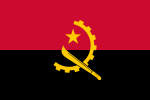Kuduro
| Kuduro | |
|---|---|
| Stylistic origins | Batida - zouk - techno - house - soca music |
| Cultural origins | Late 1980s, Angola |
| Typical instruments | PC, drum machine, vocal |
| Part of a series on the |
| Culture of Angola |
|---|
 |
| People |
| Languages |
| Cuisine |
| Religion |
| Art |
| Literature |
| Music |
| Sport |
Kuduro (or kuduru) is a type of music and dance originally developed in Angola in the 1980s. It is characterized as uptempo, energetic, and danceable. Kuduro began in Luanda, Angola in the late 1980s. Initially, producers sampled traditional carnival music like soca and zouk béton from the Caribbean, and also semba from Angola and laid this around a fast 4/4 beat.[1]
The kuduro is similar to the Kizomba rhythm. The lyrics are in Portuguese.
History
Origins of Kuduro
The roots of kuduro can be traced to the late 1980s when producers in Luanda, Angola started mixing African semba percussion samples with soca and zouk carnival music to create a style of music then known as Batida. European and American electronic music had begun appearing in the market, which attracted Angolan musicians and inspired them to incorporate their own musical styles. Young producers began adding heavy African percussion to both European and American beats. In Europe, western house and techno producers mixed it with house and techno.
In the early 90's, Angolan clubs started playing it and the youngsters started to create new dance moves to follow what the DJs were dropping.[citation needed] The history of kuduro has come about in a time of Angolan civil unrest, and provided a means of coping with hardship and positivity for the younger generation.[2] With the strong immigration to Portugal of Angolan citizens kuduro spread and evolved further in the neighborhoods of Lisbon, with the inclusion of additional musical elements from genres of Western European electronic music, giving origin to the Progressive kuduro.
Terminology
The name of the dance was referring to a peculiar movement in which the dancers seem to have a hard ass ("Cu Duro" in Portuguese), simulating an aggressive and agitated dance style.
Popularity
Kuduro is very popular across former Portuguese overseas countries in Africa, as well as in the suburbs of Lisbon, Portugal (namely Amadora and Queluz), due to the large number of Angolan immigrants.
In the Lisbon variety (or progressive kuduro), which mixes kuduro with house and techno music, Buraka Som Sistema a Portuguese/Angolan electronic dance music project based in Portugal, was responsible for the internationalisation of kuduro, presenting the genre across Europe. It featured in several international music magazines, after their appearance with their hit "Yah!" ("Yeah!"). Buraka Som Sistema takes its name from Buraca, a Lisbon suburb in the municipality of Amadora.[3] Since the explosion of the Buraka Som Sistema, kuduro dance performance videos find an increasing audience on internet video platforms like YouTube. The videos range in quality from MTV standard to barely recognizable mobile-phone footage.
I Love Kuduro (film)
The film "I Love Kuduro" directed by brothers Mário and Pedro Patrocínio premiered with great success at the International Film Festival of Rio de Janeiro, the largest film festival in Latin America, and at Portugal, in DocLisboa. "I Love Kuduro" was shot in Angola and presents the origin of the kuduro phenomenon.[4]
Artists and famous titles
M.I.A. has supported kuduro music, working on the song "Sound of Kuduro" with Buraka Som Sistema in Angola. "It initially came from kids not having anything to make music on other than cellphones, using samples they'd get from their PCs and mobiles' sound buttons," M.I.A. said of kuduro. "It's a rave-y, beat oriented sound. Now that it's growing, they've got proper PCs to make music on."[5]
- Os Lambas: Comboio
- Costuleta - kuduro: xiriri, acuxar: tchiriri
- Puto Prata e Bruno M: Cara Podre
- Puto Português e Nacobeta: Baba Baba
- Buraka Som Sistema: Kalemba (Wegue Wegue) (feat. Pongolove)
- Buraka Som Sistema: (New Africa Remix) (feat. Zakee Kuduro)
- King Kuduro: Il faut danser, Le son qu'il te faut
- Papa London: Danza Kuduro
- Lucenzo feat. Big Ali : Vem Dançar Kuduro
- Luky Gomes: Twiasee, We Gonna Have it, Jenjena
- Sissi K ( Logobi GT ): Spoiling the Koin
- Antonio carglouche feat R'nestinho: C it KSE good
- Elizio: Sabi di mas
- G-nose and Nelinho feat Papi Sanchez : Pop Pop Kuduro
- Don Omar feat Lucenzo : Danza Kuduro
- William Epps: Kuduro
- Titica Kuduro Dance Queen
- Fofando & Saborosa
- Zakee Kuduro
References
- ^ "The Afrofunk Music Forum: Kuduro: Techno from Angola to the World". Afrofunkforum.blogspot.com. Retrieved 2011-09-11.
- ^ http://www.npr.org/blogs/therecord/2012/12/26/167628341/kuduro-the-dance-that-keeps-angola-going
- ^ Miguel Judas. VISÃO nº 752 3 Ago. 2007
- ^ O bairro e a cidade encontraram-se e o kuduro pôs Angola no mundo Público, September 20th, 2014
- ^ "M.I.A. Picks Best Global Sound". Rolling Stone. May 2008.
